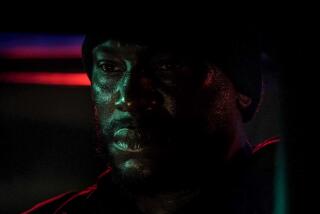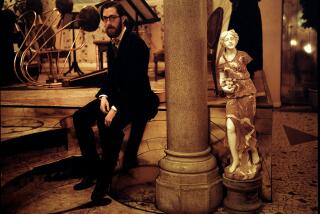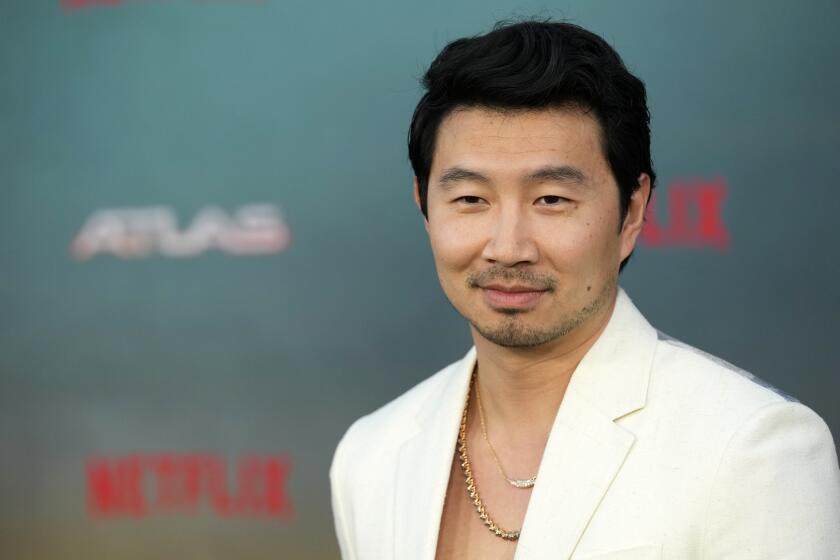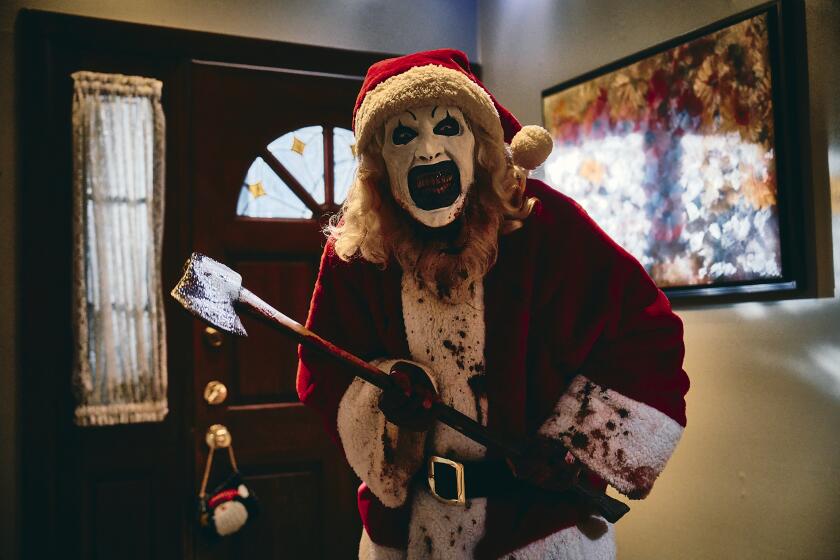Review: Twisty motel noir ‘Bad Times at the El Royale’ nearly overstays its welcome
I wouldn’t mind a version of “Bad Times at the El Royale” that consisted of Cynthia Erivo crooning ’60s jukebox hits for 141 minutes. The British actress and musician plays Darlene Sweet, a down-on-her-luck soul singer staying at a rundown Lake Tahoe motel, where at one point she holes up in her room and practices “You Can’t Hurry Love” — and the movie, heeding the words of that Supremes chestnut, lets Darlene sing and sing, drawing out the scene with breathtaking deliberation.
Something curious, plot-wise, is happening during the downbeats, but never mind that. Erivo’s voice stops the movie and a few eavesdropping characters in their tracks, and for once in this clever if languorous story, you’re grateful for the pause. The songs are like small, heavenly sunbeams poking through the shadows of a noirish alley that leads slowly but surely to hell.
Or, to be more accurate, purgatory. The El Royale, which sits on the California-Nevada line, offers its guests the choice of staying in one state or the other: It’s sly code for a nether-zone between two worlds, from which only a few visitors will be fortunate enough to escape. The writer and director, Drew Goddard, is an ambitious genre mix-master who likes to strand his characters in elaborate narrative and thematic labyrinths, much as he did in his intriguing if overly self-satisfied 2012 meta-horror debut, “The Cabin in the Woods.”
His puzzles, though rarely as ingenious or surprising as advertised, are not without their pleasures, and his actors — the principals here include Jeff Bridges, Jon Hamm, Dakota Johnson and Chris Hemsworth, a “Cabin in the Woods” alum — make invariably good company. Truth be told, I don’t much mind the version of “Bad Times at the El Royale” we have before us. Even if, with its multi-chapter narrative and time-skipping plotlines, its mix of verbal longwindedness and abrupt violence, the movie initially seems to warn of a terminal case of Tarantino-itis: an El Royale with cheese.
Shades of “The Hateful Eight” in particular may flicker to mind as the movie pulls together a remote setting, a circle of shady customers and a vague atmosphere of paranoia. But while it may sound like a tiresomely tricksy exercise, the work of one B-movie homage artist flattering another, Goddard brings enough craft to the table — evident in his sleek, prowling camera movements, his neon-lighted mise-en-scène and above all, his skill with his actors — to suspend your reservations through the leisurely opening stretch. (The cinematography is by Seamus McGarvey, the production design by Martin Whist.)
Darlene, on her way to a gig in Reno, checks in at the same time as Laramie Seymour Sullivan (Hamm), a flamboyantly hucksterish vacuum-cleaner salesman, and Father Daniel Flynn (Bridges), a priest with a friendly if not-entirely-benevolent twinkle in his eyes. Soon to follow is Emily Summerspring (Dakota Johnson), a hippie who signifies her sullen demeanor from behind a pair of stay-away-from-me shades. Needless to say, no one here is entirely what they seem, least of all the motel itself, whose lone employee, a stammering young man named Miles (Lewis Pullman), is the guardian of its many, many secrets.
The year, it’s worth noting, is 1969, which makes “Bad Times at the El Royale” one of two major releases opening this week to revisit that fateful year. But where Damien Chazelle’s space-race drama “First Man” offers a soulful, conflicted portrait of American can-do spirit in action, Goddard’s movie is more like a romp through the nation’s sleazy pre-Watergate underbelly, a whiskey-soaked Motown reverie tilting into a Charles Manson nightmare. Two-way mirrors and other secret surveillance devices factor heavily into the story, and while the script is coy about naming names, the whispers of political corruption, sexual scandal and unspeakable tragedy that slip into the foreground carry historical resonances that are nothing if not meticulously engineered.
I’ll try to tiptoe around the plot in much the same way the movie does, doling out information slowly and abounding in cliffhangers. There’s a large stash of money, a botched kidnapping, at least two instances of mistaken identity and quite a few guns. There are flashbacks that introduce us to a mysterious religious cult that reeks of flower power gone wrong, and also to the cutthroat music scene where Darlene strives to distinguish herself. (The latter occasions a weird curve ball of a cameo by Canadian actor and director Xavier Dolan as a sinister British-accented music executive.)
The flashbacks help the movie breathe and ward off its single-location claustrophobia, though at the expense of some narrative tension. The purpose of these interludes is not just to fill in the blanks but also to amplify the characters’ sense of entrapment, to suggest that their fates have been doomed to converge from the start. But that idea never fully coalesces, and the material rarely feels rich or intricate enough to justify Goddard’s twisty games with chronology, his delight in planting blatant cliffhangers and replaying key events from different perspectives.
The weakest element is Hemsworth’s character, who is introduced late enough in the proceedings that I’ll describe him simply as a very mean man with a very nice chest — what you might call an abdominable human being. It’s no knock on Hemsworth, a terrific actor with a gift for self-deprecating comedy, to point out that flashy, one-note villainy doesn’t play to his strengths. Similarly, the characters played by Johnson, Hamm and Cailee Spaeny, who turns up as a young waif of few words and cruel intentions, manage to sustain your interest without ever feeling like more than bullet points in a twisty narrative agenda.
In some ways, Miles is the biggest pawn of all, a terribly earnest, eager-to-please young man beset by demons too awful for the movie to even fully articulate. If this is indeed a vision of purgatory, then it is Miles who is forced to bear not only his own sins but also those of an entire era — and Pullman’s performance is wrenching enough to inspire your belief in that conceit, or at least to make you long for his absolution.
The soul of the movie, however, lies with those who are made of sterner stuff. It’s in the tense but delicate rapport between Father Flynn and Darlene, circling one another warily before forging a genuine connection, that “Bad Times at the El Royale” springs to life, and the meandering, elongated rhythms of Goddard’s dialogue begin to pay off. Bridges, who consumes a fair amount of liquor in the movie, is starting to resemble a barrel-aged whiskey himself: His grizzled charm carries a purer, smoother finish with every new role.
But the standout is Erivo, who will next be seen in Steve McQueen’s thriller “Widows” and whose performance here is revelatory in the most rewarding sense. Watch how carefully and patiently Goddard frames her face as she stares into a mirror, or breaks down crying and praying as a storm rages outside her window, and you’ll feel something remarkable: a filmmaker falling in love with an actor, wholly and unreservedly, in a way that encourages the audience to follow suit. Darlene easily becomes the story’s most consequential figure — the one you root for, the one you fear for, the one who emerges as a flesh-and-blood creation rather than a noirish construct. She makes these bad times sing.
------------
‘Bad Times at the El Royale’
Rating: R, for strong violence, language, some drug content and brief nudity
Running time: 2 hours, 21 minutes
Playing: In general release
See the most-read stories in Entertainment this hour »
Movie Trailers
More to Read
Only good movies
Get the Indie Focus newsletter, Mark Olsen's weekly guide to the world of cinema.
You may occasionally receive promotional content from the Los Angeles Times.











